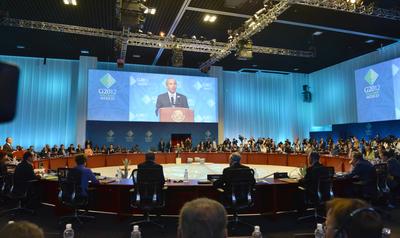Failure to implement reforms does not necessarily mean that the G20 process itself has failed. Rather, it indicates the multiple challenges to implementing such reforms.
The G20 is almost doomed to fail the way it is structured presently because the most difficult and sensitive issues are deferred to the leaders while other less difficult and more technical issues are resolved at the Sherpas’ and Ministers of Finance and Central Bank Governors’ Meetings. Leaders who make promises abroad are often unable to fulfil them at home because national legislatures retain autonomy over regulation. And, further, many G20 countries have weak executive leaders who preside over a fragmented polity, which makes implementing policy extremely difficult.
Commitments made at the G20 are non-binding and there is no formal enforcement system. The Los Cabos Summit delivered the first policy progress accountability report of the G20 — but the report was written by national governments. The G20 needs a more balanced assessment of policy implementation that incorporates the input of national governments but is written by an independent organisation. National governments still need to be involved so that the accountability report is not used to castigate other countries for their lack of progress.
Animosity, shifting coalitions and potential blocs within the G20 — such as the G7 and BRICS — also affect the likelihood of reaching consensus. Although the United States–China relationship is vital, the two countries have so far failed to have a meaningful security dialogue, and this is becoming a serious problem. Trilateral cooperation between Japan, South Korea and China is on the rise, but their bilateral relations have reached rock bottom. Since 2009, the bloc of European countries has become very fragmented. Even within-country policies have become unclear: in Japan, for instance, different ministries were saying different things about the same issue before the Los Cabos Summit. Suspicions — over the G7 dictating the G20 agenda, the United States using the Trans-Pacific Partnership to contain China and so on — continue to lower cooperative spirit within the G20.
So what can be done to make the tree of global economic governance institutions grow healthy and robust?
First, the G20 must have clear goals and deliver on its agenda of reforming the global financial regulatory system that contributed to the global financial crisis of 2008–09. People in G20 countries must become familiar with these goals: a Financial Stability Board report to the G20 on financial regulatory reform received no media attention in 11 of 12 G20 capitals surveyed. The invisibility of financial regulation reform is concerning because success depends on public support.
Second, a strong tree needs strong branches. International financial institution reforms, including IMF quota and voting reforms, must be completed. The G20 cannot work with an international framework that no longer represents the global economic structure.
Third, there needs to be better coordination between institutions. International organisations tend to concentrate on one specific policy area. But most problems span many different areas, so organisations need to coordinate with each other to come up with the best response to policy issues. For example, the issue of climate change is linked to poverty because poor farmers will lose the most from its effects. The issues of globalisation and financial and trade liberalisation are also issues of inequality: the world needs a new theory to explain why inequality has increased in both developing and developed countries in the past five years. There are also emerging issues. For example, globalisation means that central banks no longer hold a monopoly on creating money, as the latest round of US quantitative easing showed.
Fourth, there needs to be a clear division of labour between global and regional institutions. Otherwise, the G20, APEC, ASEAN, the East Asia Summit and other institutions could end up repeating one another’s good work. The world needs to know how regional and global institutions relate to one another and how each country — whether rich or poor — relates to the global system.
If the G20 has discrete responsibilities there will be less doubling up. The G20 must make clear what it does and does not want to do. It is also important for the G20 to ‘compartmentalise’ issues to avoid mixing economic and geopolitical matters.
Lastly, the G20 must have clear and limited goals. It is more effective to fix one problem than to ‘make progress’ on ten.
In the long run only success can preserve the credibility of the G20. The G20 is a valuable process right now because it provides an opportunity for dialogue at the highest possible level. The importance of that dialogue must not be underestimated. The G20 should not be judged solely by its failure to implement reforms and achieve cooperation, especially in relation to the European crisis.
Maria Monica Wihardja is a researcher at the Centre for Strategic and International Studies, Jakarta, and a lecturer at the Department of Economics, University of Indonesia. She is also Associate Editor at the East Asia Forum Indonesia desk.

